What Is an RPA Developer: Skills, Responsibilities, and Hiring Options
Updated 07 Jul 2023
17 Min
2226 Views
As the world has turned digital, it’s vital to keep up with the latest technology to survive. Modern technological solutions continue to grow and open immense opportunities for enterprises. Robotic Process Automation (RPA) is one of the most impacting trends.
With RPA development, businesses can turn to software robots to fulfill repetitive manual tasks. It will result in better productivity, higher quality of products and services, cost savings, and clients satisfaction. The growing need for automation, leads to an emergency of new professionals capable of implementing automation software solutions into internal business operations. And one of them is the RPA developer.
But who are these people, and what are they doing to support a successful RPA project? In this article, we’ll discuss the RPA developer role, their skills, and responsibilities, along with the RPA software development life cycle. You’ll also learn where to look for such experts and how much it will cost you.
Robotic Process Automation: An Overview
To understand the position of RPA developer, first, let’s discuss what robotic system automation stands for, how it performs, and what opportunities it brings to companies.
What is RPA?
Robotic Process Automation or RPA is a practice of using and implementing advanced technology like AI and Machine Learning to automate and streamline repetitive and lower-value tasks that previously required human involvement. Some of these tasks include logging into the system, data transmission, performing transactions, filling in forms, or generating reports.
One of the biggest misconceptions about RPA technology is that it’s the same as Artificial Intelligence. However, RPA solutions use the benefits of Al for managing cognitive processes like data interpretation, screen visualization (interacting with on-screen elements), and engaging in chats.
But how does the RPA system actually work?
Suppose you need to extract data from several invoices into spreadsheets, attach all the necessary financial reports, and send it to the Senior via email at a specific time every day. This is where RPA technology is applied. The program keeps all the required steps and reproduces them repeatedly.
Robotic process automation optimizes business-related operations resulting in better productivity and employees’ engagement, thus, increasing profits. Instead of running routine tedious tasks, organizations can focus on more creative things that require higher intelligence, like new project development or sales management.
Learn how application modernization services can help improve your workflow efficiency.
Why Develop RPA System
The global economy bar has been set high, so it’s become vital to adapt to changing market needs, enhance work agility, and provide a first-class customer experience.
End-to-end automation, along with software bots implementation, will allow enterprises to identify the areas that require modifications, take corresponding actions, accelerate the internal workflow, and unlock a company's full potential.
Let’s examine the potential of RPA system implementation relying on research insights.
- The global robotic process automation market size is valued at $2 billion in 2021 and forecast to reach $13 billion in 2030.
- Automations result in saving 20 minutes of work per employee daily. It means that ten thousand employees with software robots can save a company more than $30 million per year.
- More than 45% of organizations are going to adopt robotic process automation solutions to capitalize on digital transformation.
- RPA solutions can reduce operational costs up to 60%.
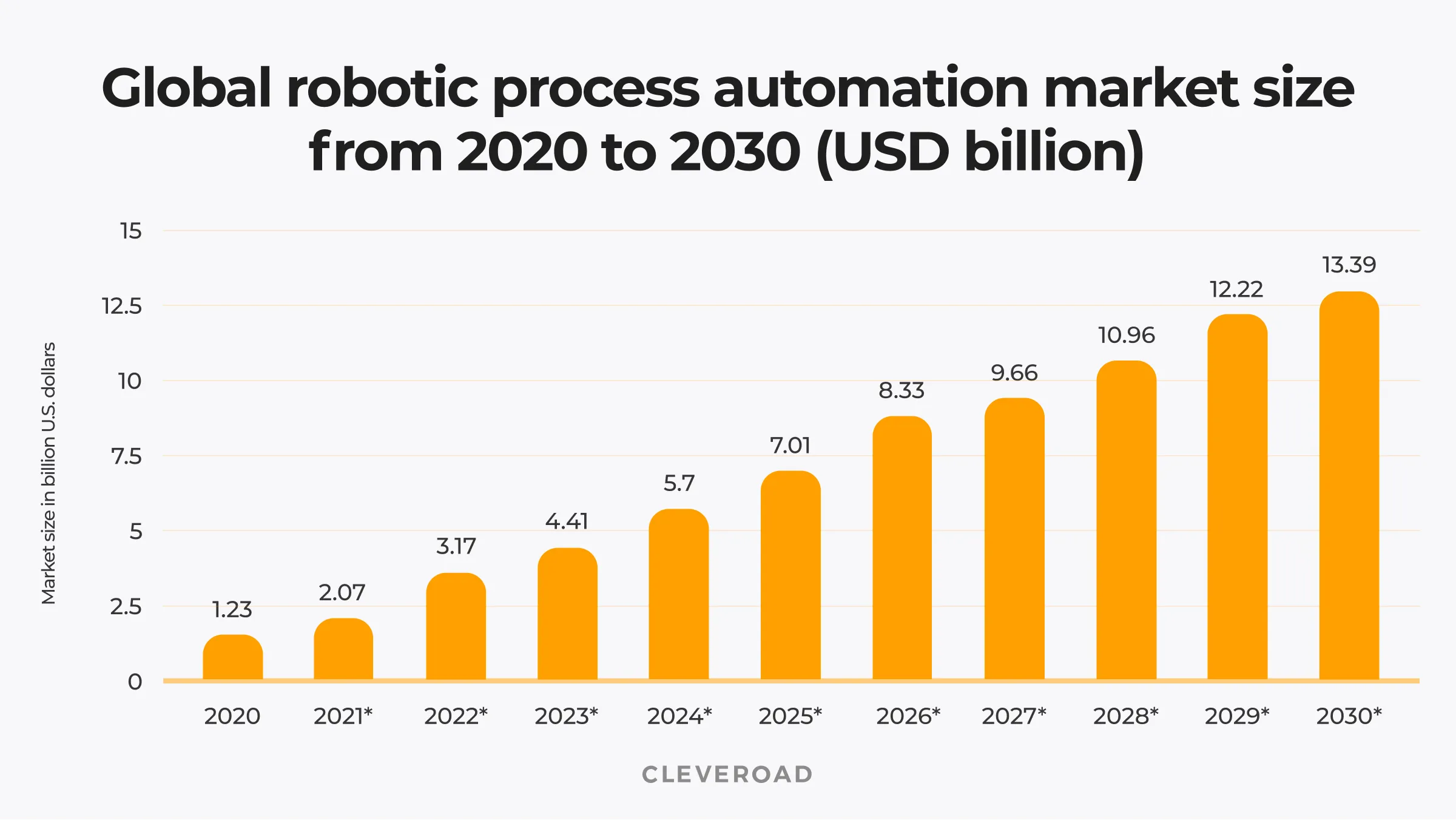
Global RPA market value prediction (Source: Statista)
RPA solutions are widely implemented across the industries, from logistics to healthcare and retail, to automate such tasks as inventory management, invoice generation, sales order processing, client data organization, etc. However, successful automation depends on the proper RPA system deployment and implementation. That's why it's crucial to cooperate with experienced robotic process automation developers to deliver a powerful end-to-end platform.
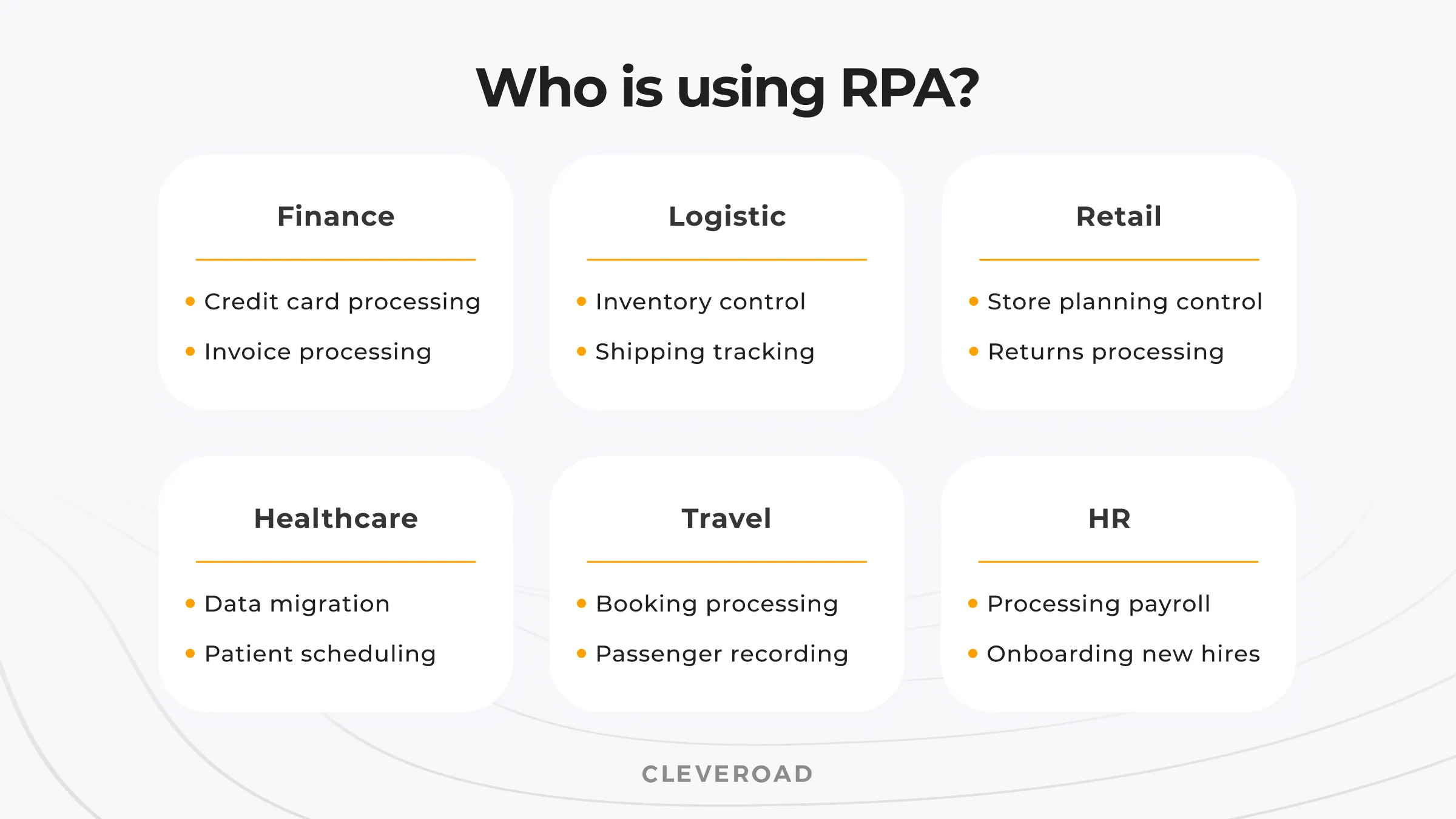
What industries can gain from RPA solutions
Benefits of RPA Technology
Now, let’s discuss the reasons why you should implement RPA technology into your business processes. We have gathered the essential benefits that your company will receive when it starts using software robots.
Increased productivity
About 78% of business owners agree that automating tasks within the company boosts productivity for everyone involved. RPA robots execute business-related tasks much faster than humans. As a result, companies can experience productivity growth without increasing the recruitment cost the company would have faced if they had hired new employees to fulfill the same tasks within the same period.
Higher accuracy
Over 50% of organizations agree that RPA development reduces manual errors. Computers do what they’re programmed to do. They don’t make errors because of tiredness or inattention. In addition, whether it is RPA in banking or any other industry, such software also submits a thorough audit trail, so companies can monitor what was done and when.
Enhanced flexibility
Robotic solutions are flexible enough to adjust to new business initiatives. Instead of asking IT specialists to free up the time and resources to modify the basic business systems, managers can easily make improvements within RPA software. It’s because RPA is overlaid on the enterprise systems and not integrated into them.
Hence, RPA deployment is associated with a low risk of disruption. In fact, the combination of RPA and AI in healthcare already proves how automation can streamline workflows while keeping critical operations stable.
Cost savings
RPA leads to improved business metrics across various industries globally due to efficiency gains and enhanced customer experience. In fact, 57% of entrepreneurs state that automation technology cuts between 10% and 50% of the departments’ costs formerly connected with manual processing.
RPA Solutions’ Development Stages
Consider the RPA development stages described below to implement RPA software into your existing business processes successfully.
Step #1. Planning Phase
This stage includes problem analysis and revealing business operations that can be automated to remove manual responsibility and boost operational performance. If the decision is made to automate the chosen process, the RPA analyst, along with the RPA solution architect, scrutinizes the complexity of the process.
Step #2. Solution Design Phase
At this stage, the automation roadmap is designed. Additionally, there is a need for a Process Definition Document (PDD) that details the information about each step that should be taken to automation. Once all the project’s requirements are scrutinized and PDD is prepared, other conditions like time spent, number of specialists working on the task, and budget are discussed.
Then, the team makes a blueprint for understanding the flow of the process. The Flowchart helps RPA developers to define which steps require automation and what are demands they have. Afterward, the software engineers pick the RPA software tools to start bot development for task automation. This is where we proceed to the heart of the process — the Development stage.
Check out our full guide on how the Discovery Phase goes at Cleveroad
Step #3. Development Phase
This phase stands for creating automation software based on Process Definition Document under the chosen RPA tools. Depending on the types of automation, there may or may not be coding required. For example, some providers offer visual scripting tools enabling non-technical users to build RPA bots without making a line of code. Once the development stage is over, the next step is to test the bot’s functionality. Additionally, initiatives that integrate RPA and AI in healthcare must include rigorous validation steps to confirm HIPAA compliance and safeguard patient data before the bots move into production.
Step #4. Testing Phase
In this phase, the bot efficiency is tested under the pre-production environment to see whether the bot complies with requirements while automating specific tasks. However, if the test fails, the bot returns to the development phase, where all detected errors are fixed and tested again.
Step #5. Deployment and Maintenance Phase
This phase signifies the deployment of automation software for the customers’ use. The RPA automation developers also provide continuous software maintenance to clients in case any defects may occur. RPA service solutions provide immediate problem solving even after handing the product to the clients.
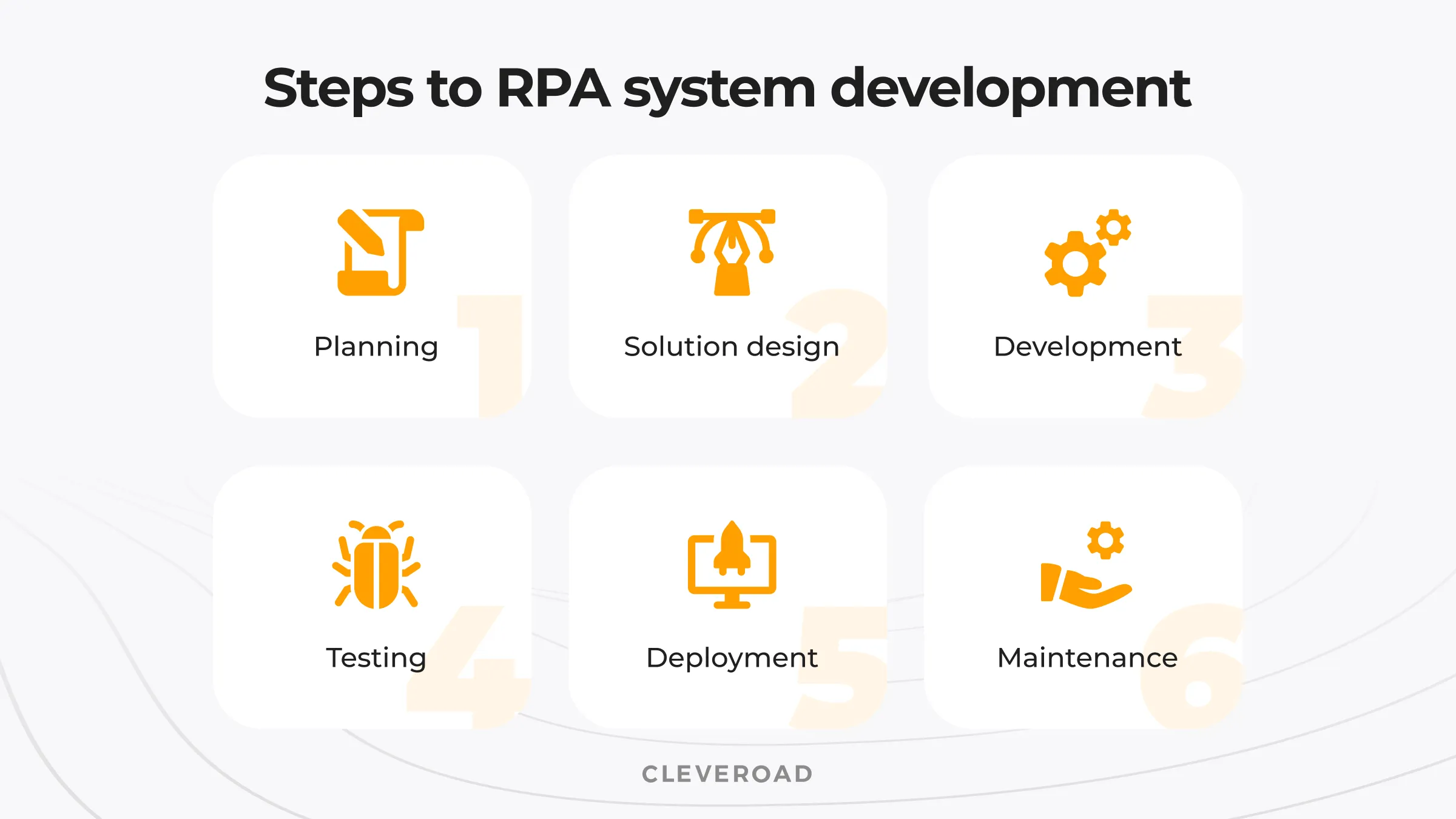
How to build RPA system
What Is RPA Developer
An RPA Developer is a specialist who’s responsible for building, deploying, and implementing automation bots to optimize business process workflow and accelerate digital transformation.
Even though the position includes the word “developer”, RPA engineer’s tasks don’t meet typical programmers’ routines. Instead, they combine coding, analytics, and project managing skills.
PRA robots can be applied to loads of processes at once. So, whenever there are more than ten bots, the system is scaled with its own server, tracking tools, and administrative dashboard.
RPA Developer’s Responsibilities
Mainly, “RPA developer” is a broad term that is used to define an RPA expert. However, the title can vary depending on the developers' duties and responsibilities. So let’s discuss what stands behind each role in different development stages.
RPA Analyst
RPA Analysts engage in the planning phase and are responsible for studying the opportunities for process automation. They scrutinize the company’s operations and identify business-critical points that slow down digital transformation, thus, should be automated. RPA Analysts work closely with PRA Solution Architects to determine the project’s requirements and carry out the functional and technical design of the automated solution.
RPA Solution Architect
RPA Solution Architects take part in the solution design phase. They’re in charge of gathering and further implementation of projects’ requirements. They interview staff members to define the pain points and what part of the workflow requires automation. Finally, Solution Architects draw up the Process Definition Document and detail the steps in project fulfillment.
RPA Engineer
RPA Engineers design the RPA project under the approved requirements using RPA tools. Their primary responsibility is to deliver the bot that will perform a strict series of actions. Depending on the tool used, RPA developers may or may not have a high programmer level, but still, they should have some experience in coding and problem-solving skills.
Apart from bot development, RPA Engineers also create an ecosystem of tools for bots management or/and workforce administration. It includes desktop or web applications, management panel, training interface, and the physical server to deploy RPA software. Moreover, if you don’t have an in-house testing team, RPA experts can handle this part.
Check our article "In-house development vs. Outsourcing" and decide what cooperation model is more appropriate for you.
RPA Administrator
RPA Administrators engage in the Maintenance phase and are in charge of system support. They also initiate the changes based on the client’s feedback and monitor those modifications during the development and testing stage. Their task is to ensure that project requirements have not been bypassed.
Production Manager
When the product is tested and released, it’s a Product Manager's responsibility to ensure the processes are run as intended. In case of anomalies, they create a bug report and submit it to the engineer. Product Managers also provide solution architects review analytics and information about the improved business processes.
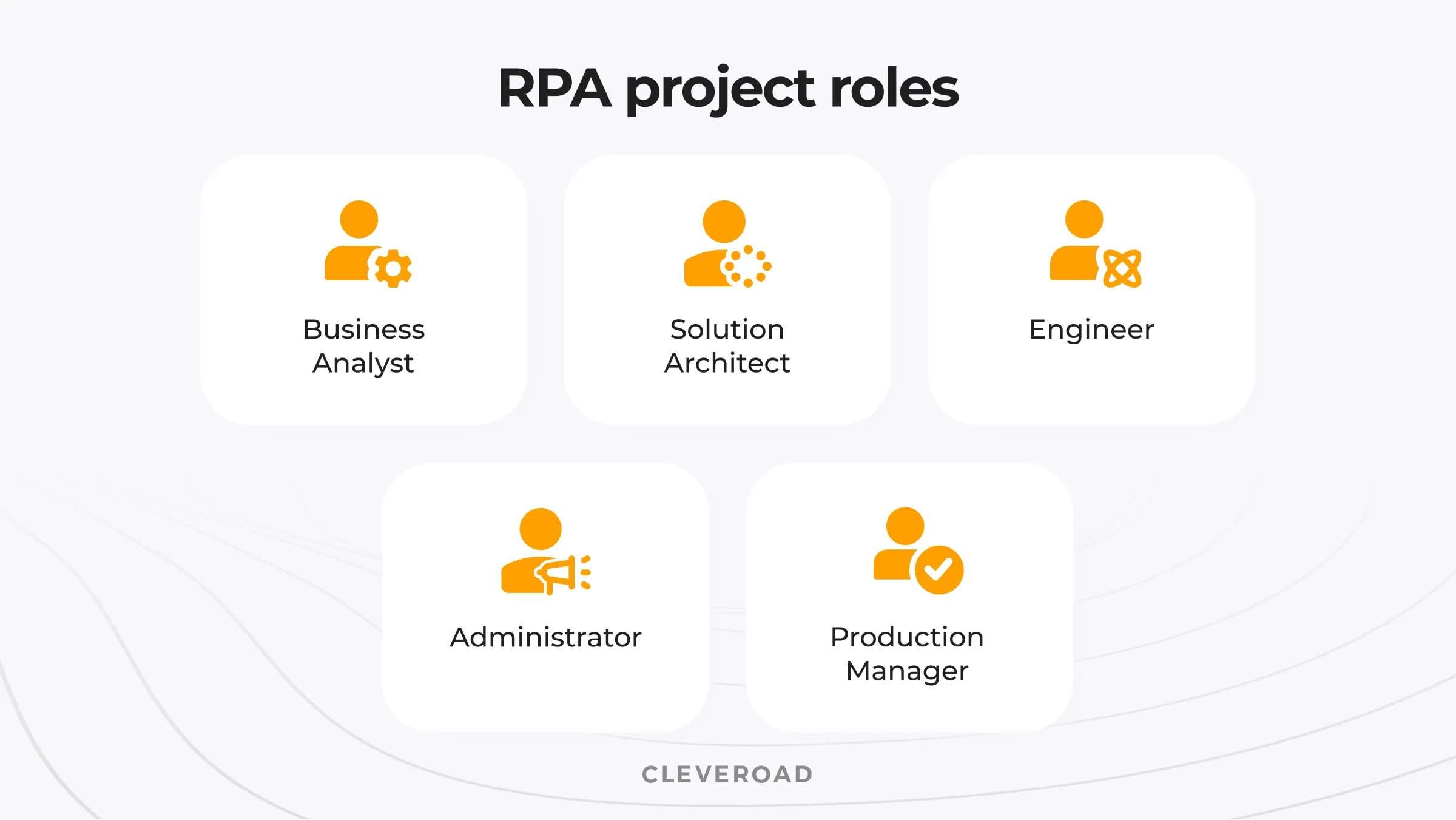
RPA team roles
Skills and Knowledge Required by RPA Developers
As you've noticed, RPA engineers are quite diversified specialists. Apart from programming knowledge, they should be aware of the company's business needs and processes. You can hire a cross-functional expert or build a team where each team member has a unique set of skills.
Before starting cooperation with RPA automation developers, think of what hard and soft skills you should consider to ensure that company robotic process automation initiatives will succeed.
Hard Skills
Studying through popular hiring platforms like Upwork and Toptal, we’ve pointed out the RPA programmer’s tech skills.
Coding language
Most RPA platforms are developed on Microsoft .NET Framework. Visual Basic .NET is the basic programming language applied in RPA projects that enable access to Microsoft's library ready-made methods. It allows engineers to process all the data that may pass through a robotic process automation solution.
Other programming knowledge required:
- Python (multiple bots employs scripts written on Python)
- C/C# (used for making desktop RPA software)
- JavaScript (used for creating web-based RPA)
Good knowledge of RPA tools
You can consider using out-of-the-box RPA solutions such as UiPath or Automation Anywhere to deploy RPA systems. In this case, robotic process automation developers should be experienced in adopting and maintaining these technologies.
A ready-to-use solution is a good choice if you want to integrate the automation tools as fast as possible. However, they’re limited in functionality and may not match your requirements. In turn, custom solutions provide flexibility of features and will satisfy your business needs.
Work with cloud technology
Some software development companies utilize the cloud infrastructure for adopting RPA software. As a result, RPA specialists should be proficient in AWS or Azure cloud services to deploy bots in the cloud.
Machine learning expertise
There is a term that is called “ Cognitive automation.” It’s a new branch of RPA technologies encompassing machine learning (ML), Artificial intelligence (AI), and RPA that takes bot development to a higher level.
When looking for RPA specialists with ML-based expertise, bear in mind that machine learning is a complex area. Thus, one person can’t be responsible for software development, RPA integration, and model training at once. So you’ll need to cooperate with a couple of RPA experts.
Soft Skills
Hard skills indicate the developer’s tech-savviness and proficiency with development tools, which is critical for RPA-related positions. However, as you’ve learned earlier, robotic process automation developers perform different roles depending on the development lifecycle. Therefore, let's consider what soft skills are required.
Data orientation
Before proceeding to the development part, RPA engineers need to explore internal business operations to define what process flows need to be automated. Hence, experience with data analytics is vital. RPA experts convert complex data sets into a series of specified rules.
Problem-solving skills
It’s not just a line in the resume. RPA software aims to solve industry-specific challenges and streamline budgeting. So your candidate needs to join various professional skills with an RPA expertise.
Change management capabilities
RPA development teams have to know how to manage modifications integrated into automated processes to prevent adverse impacts. It means that RPA engineers need to comprehend how and why updates affect the programs built to automate given operations. And therefore, decide what upgrades to add to the RPA bots to adjust to upcoming modifications.
Process mining proficiency
RPA professionals often apply process mining to create automation strategies and identify the best possible implementation tactics. Thus, robotic process automation engineers need to know how to distinguish the business-critical processes that need automation, track those processes using data, and map a flowchart of decision logic through software.
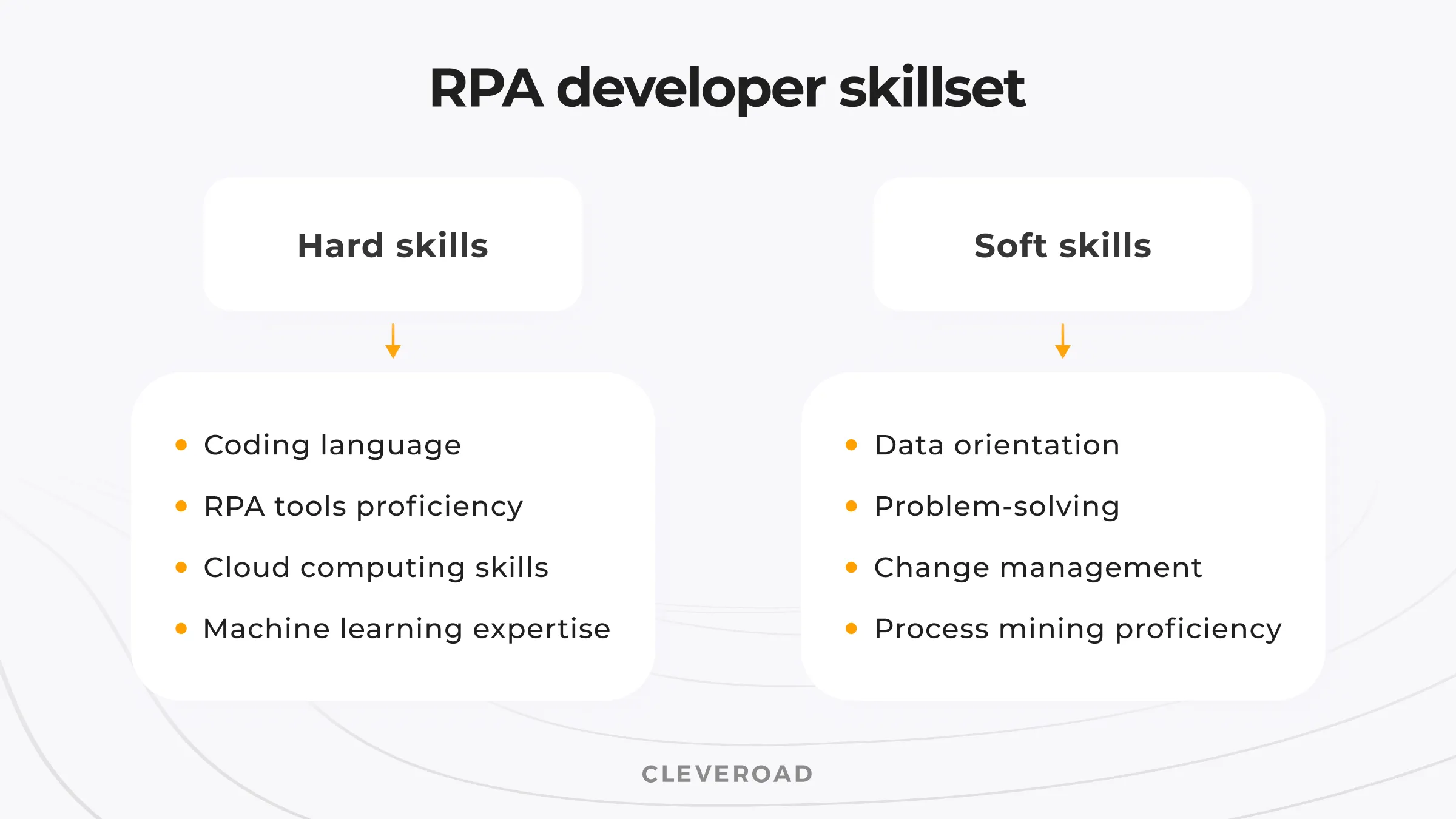
Hard and soft skills required for an RPA developer
What is RPA Certification
Certificates represent developers’ knowledge working with a specific RPA platform. As for the business owners, it enables them to evaluate candidates’ tech knowledge and to determine if they’re experienced enough to work on your project. Moreover, it allows employers to find a specialist with RPA platform-specific knowledge quickly.
From an employee's point of view, certification is mainly required for a specific organization. However, it’s the fastest way to become an RPA automation developer, increase credibility, and gain credibility.
There are three well-known providers that offer different types of training. Let’s discuss each certification process in more detail.
UIPath certification
UiPath is the most famous RPA learning platform covering all aspects of robotic process automation, including the business analysis one.
The UiPath certification is split into two categories:
- UiPath Certified RPA Associate (UiRPA) is a training program for beginners in any role. Certified specialists can resolve simple automation tasks or be a part of an automation team and work under the Senior.
- UiPath Certified Advanced RPA Developer (UiARD) is a learning program for the next level of professionals. Senior RPA engineers are capable of handling any complexity of automation tasks and manage the RPA development lifecycle.
Associates interact with PRA platforms, design bots, and deploy the relevant infrastructure.
Automation Anywhere certification
Automation Anywhere is the second biggest RPA educator provider. Unlike the UiPath, this platform split the training programs depending on the role-specific skills: Citizen Developer, Bot Developer, and Business Analyst.
The certification process is divided into three categories:
- Essentials RPA Certification for faculty. This course covers topics relating to RPA essentials, Automation Anywhere platform basics, and RPA-based business apps.
- Automation Anywhere Certified Advanced RPA Experts. This course will help participants define opportunities and needs for automation and apply Automation Anywhere software for designing bots and corresponding ecosystems.
- Automation Anywhere Certified Master RPA Professional. The examination is made for enterprise-level specialists and covers thorough comprehending of RPA software for various business use-cases. It also includes the part on how to create bots and related infrastructure.
BluePrism certification
Blue Prism University covers a new branch of RPA and focuses on cognitive automation. The training course includes the basics of Blue Prism platform RPA development and framework management along with a learning program for AI-based software in RPA. The certifications process is split into five categories:
- Developer. An examination for different level RPA developers on RPA development, data management, and so on.
- Professional Developer. A program for advanced engineers focusing on automation specifics in various production environments.
- Solution Designer. A certificate includes solution design with an RPA system.
- Technical Architect. An examination for back-end developers on Blue Prism RPA infrastructure.
- Robotic Operating Model Architect. RPA system deployment on the enterprise level, including different business aspects and implementation tactics.
Where to Hire RPA Developers and How Much Will They Cost You
After knowing what skills your ideal candidate should obtain, it’s time to consider where to find RPA programmers who’d implement automation solutions to life.
There’s no sure way to tell you whether you should work with a freelance RPA expert or sign a contract with an outsourcing IT development company. Each option is relevant in different situations and depends on your goals, project requirements, and budget.
Let’s take a quick look at each hiring option.
Option #1. Freelance
You can hire independent contractors using popular freelance platforms like Upwork, Freelancer, or Toptal. But it works well for small tasks (e.g., build a simple bot) or software upgrades, as one freelancer can’t be responsible for creating an RPA system. In this case, you need to hire a few freelance RPA developers and QA engineers.
Pros:
- Low pricing solution
Cons:
- Communication issues
- Harder to control
- Chances for project abandoned
Option #2. In-house Team
If you’re looking for RPA programmers to work remotely as a part of your company, or you want to assemble an in-house team, then this option is for you. It’s a good option if you run multiple projects and want to be completely involved in the RPA development. In-house teams are common practice among enterprises that want to have a high level of control and improve communication between employees.
Pros:
- Full control over the development process
- No communication issues
Cons:
- Overpriced service
- Additional expenses (rent, hardware, software, taxes, etc.)
- Time-consuming hiring process
Option #3. Outsourcing Agencies
You can consider outsourcing RPA system development. In this case, you’ll shorten the time to market and get a high-quality product for a reasonable price. The best thing about cooperating with an outsourcing IT agency is that you get a vast pool of experienced RPA automation developers you need to design and build RPA solutions. Also, they’re responsible for team management and product delivery.
Pros:
- Team of experienced specialists
- A detailed estimate
- Turnkey testing
- Quality control
Cons:
- Outsourcing is more expensive than freelance but cheaper than creating an in-house team
We’ve created this comparative table to help you make a decision.
| Attributes | Freelance | Outsource | In-house |
Development cost | The lowest price to design a product | Reasonable price for the obtained quality | Require additional expenses |
Product quality | Unpredictable quality, no guarantees of a viable product | Excellent quality, sustainable performance | |
Communication with the client | Lack of project management leads to unawareness | PMs always keep you informed about the project condition | You have total control over the project and your team |
Team cooperation | Freelancers can’t manage tasks effectively without PM | Both teams use scrum methodology that serves for perfect teamwork | |
Quality assurance | Freelance developers usually don’t handle testing | QA engineers test the bots efficiency and fix bugs | To test the project, you have to hire QA engineers |
In terms of price, RPA developers’ rates can vary depending on experience, level of certifications, and the stack of technologies the specialists work with.
According to ZipRecruiter, a US-based hiring platform, freelance RPA engineers get $103,758/year on average. That's $50 per hour or $8,646 per month. According to Indeed, RPA developers are offered a $96,640 to $134,254 salary per year. PayScale claims $86,000 to be an average RPA engineer's salary in the USA.
Of course, RPA developers’ rates also heavily depend on location. We’ve analyzed RPA engineers’ rates in different countries, including popular outsourcing destinations like Western and Eastern Europe. Rates are taken from UpWork, YouTeam, Clutch, and GoodFirms platforms.
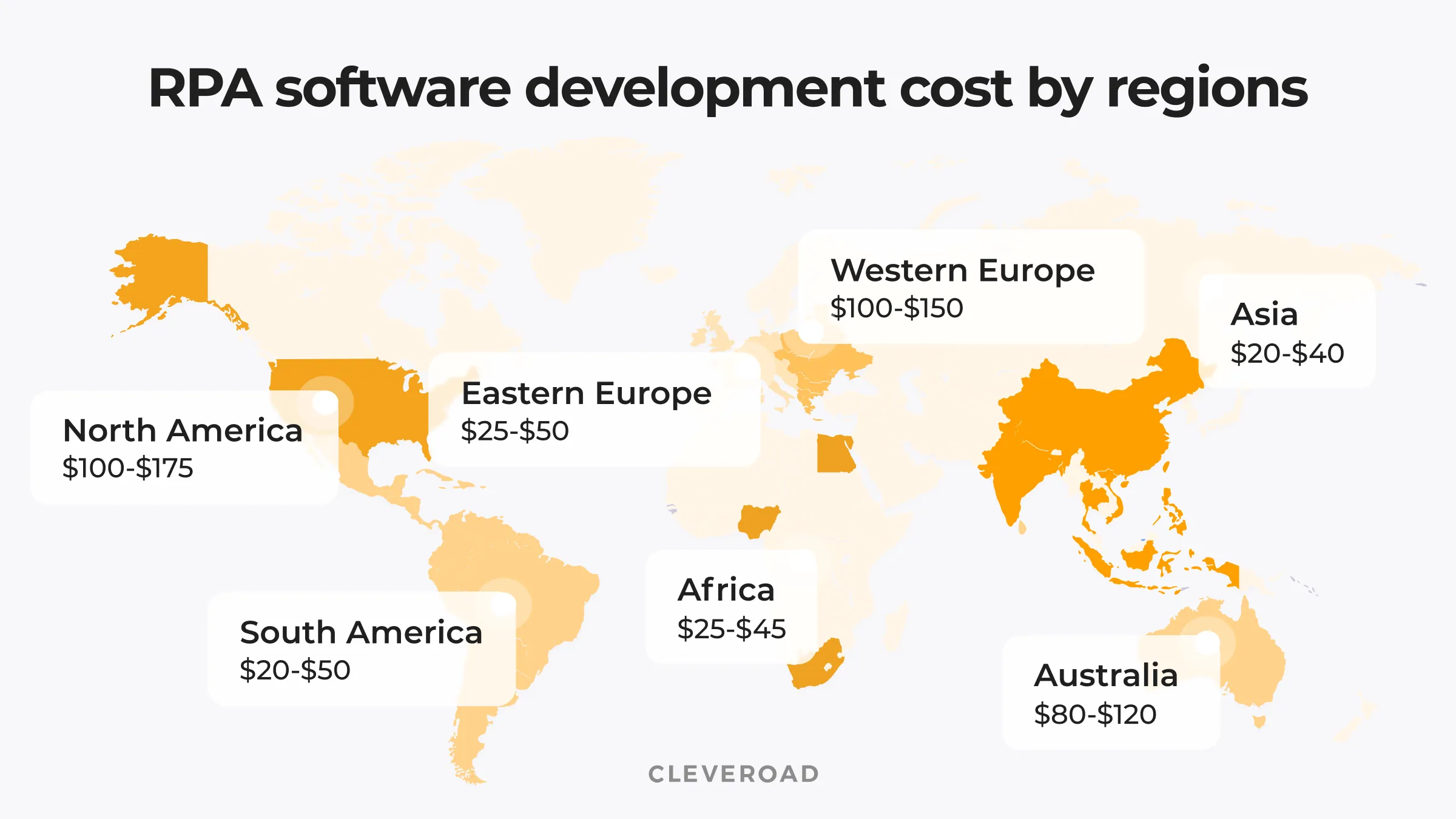
Global RPA developer rates by region
The average salary of software engineers globally are as follows:
- USA — $92,046
- Australia — $49,674
- Germany — $53,713
- United Kingdom — $40,497
- Ukraine — $22,389
How Our RPA Developers Can Help You
Cleveroad developers have 10+ years of experience in building and implementing custom software solutions, including RPA. Our team will help you go through a digital transformation using RPA technology to optimize your business processes, reduce employee cost while increasing efficiency and productivity.
We work with three types of contracts – Time and Material, Fixed Price, and Dedicated Team. Our development approach slightly differs for each of them.
- Time and material. We give a client an approximate estimation of the scope and start a project without having an exact scope of work in hand. We plan each sprint and agree on all the project details with the client. According to this approach, we can make changes even in the middle of the software development process.
- Fixed Price. This model implies a fixed scope of work, detailed estimations, precise requirements, and strict deadlines.
- Dedicated team. This type of contract is the right solution for large-scale and complex projects like warehouse automation. We agree on cooperation terms and submit software developers to the client's project.
RPA system development is a multi-stage and complex process requiring thoughtful preparation and in-depth knowledge of the field. So the best way to successfully implement robotic process automation is to contact an experienced vendor and discuss your plans and ideas with them.
Need to upgrade your business?
Get a RPA system tailored to your workflow! We'll help with the development and estimate it for free
RPA developer is a specialist who's responsible for building, implementing, and maintaining bots or an ecosystem of automation tools to optimize business process workflow and speed up digital transformation.
RPA developers are diversified specialists, combining analytics, coding, and project management skills. Among hard skills are coding proficiency, analytical skills, RPA tools expertise, cloud computing knowledge. If we talk about soft skills, RPA developers should orient in vast amounts of data, be problem-solver, and know how to manage modifications integrated into automated processes.
RPA developers’ responsibilities depend on the RPA system development stage. Thus, they are in charge of planning, solution design, development, testing, and maintaining automation bots and corresponding software.

Evgeniy Altynpara is a CTO and member of the Forbes Councils’ community of tech professionals. He is an expert in software development and technological entrepreneurship and has 10+years of experience in digital transformation consulting in Healthcare, FinTech, Supply Chain and Logistics
Give us your impressions about this article
Give us your impressions about this article